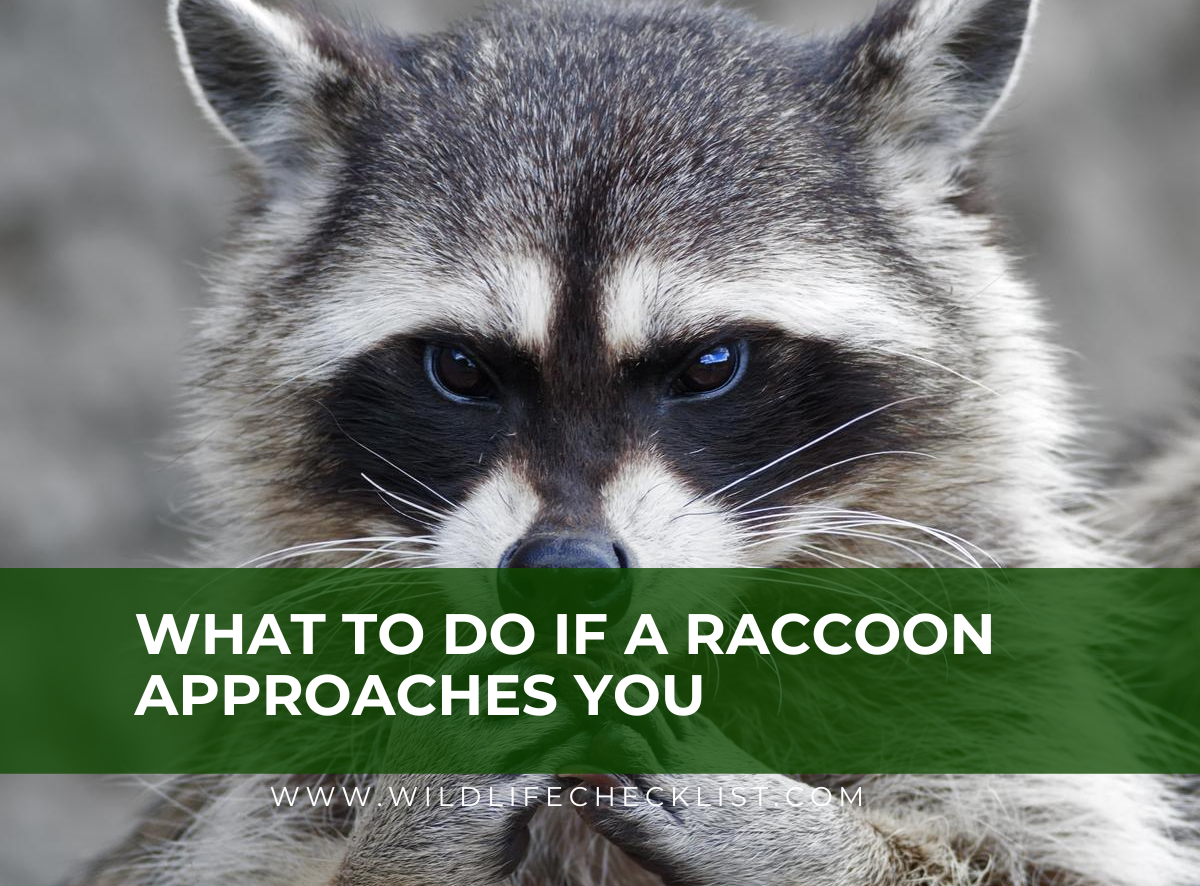6 Things To Do If A Raccoon Approaches You

Wildlife encounters may be exciting and unsettling, especially involving a curious and adaptable animal like a raccoon. Raccoons have become a common sight in urban and suburban settings thanks to their distinguishing mask-like markings and agile paws. Raccoons normally avoid humans, yet occasionally they may come close to us, leaving us unclear about how to respond.
This article will discuss what to do if a raccoon approaches you and offer helpful advice to ensure responsible and safe contact. We can promote peaceful coexistence between people and these fascinating animals by comprehending raccoon behavior and taking the necessary precautions.
Raccoons are opportunistic, intelligent animals well-known for their capacity to adapt to various situations. Raccoons may seem cute and innocent, but it’s important to remember that they are wild animals and must be treated with care.
Contents
How to React if a Raccoon Approaches You
Understanding what to do when a raccoon approaches can help avert potential conflicts and guarantee the safety of both humans and raccoons. Whether you’re a nature enthusiast, a homeowner, or simply someone who wants to be ready for unexpected wildlife interactions, the information below will surely help you.
Stay Calm and Maintain Distance
It’s best to avoid frightening the raccoon by making loud noises, quick movements, or panicky cries. You lower the likelihood of the situation worsening by maintaining your composure.
Maintain a secure distance while slowly backing away from the raccoon. Raccoons often want to avoid physical conflict with people and will flee if given the chance.
Do Not Touch or Feed
It’s important to avoid touching or feeding the raccoon. Raccoons are wild animals, so they may defend themselves if they sense a threat. It is not in the best interest of their natural behavior to feed them because this can result in dependence and habituation.
Secure Food and Trash
Raccoons are drawn to human-populated places because there are food sources there. Secure your food and trash correctly to reduce the possibility of attracting raccoons.
Use solid, latched trash cans, and if raccoons are a persistent problem, consider adopting animal-proof bins. Raccoons can be attracted by placing pet food or unmanaged food outside.
Protect Your Pets
It’s critical to maintain control of your pets during a raccoon encounter. Pets may be viewed as a threat by raccoons, and interactions can quickly become hostile.
To avoid any potential danger to either your pet or the raccoon, keep your animals on leashes and at a safe distance from them.
Seek Professional Help if Necessary
It is advised to contact local wildlife authorities or animal control organizations in rare cases where a raccoon appears ill, hurt, or especially hostile. These experts have the knowledge and resources to deal with such circumstances safely and responsibly.
It is crucial to avoid attempting to handle or approach a wounded or hostile raccoon on your own because doing so can endanger your safety.
Promote Coexistence
For the benefit of both raccoons and humans, coexistence must be encouraged. Recognize that raccoons are an essential component of our ecosystems and are crucial to preserving the harmony between urban and natural settings.
We can create an environment where people and raccoons can live in harmony by putting into practice strategies to lessen human-wildlife conflicts, like securing waste and avoiding direct feeding.
What to do if a Raccoon Attacks You
It is unusual to come across a hostile raccoon because they often shun conflict with humans. However, it’s important to understand how to defend yourself and reduce the possibility of injury if a raccoon attacks you.
The first and most crucial task is to maintain your composure. Fear or panicking can make the raccoon more hostile and aggravate the situation.
Remember that raccoons normally attack in self-defense, so keeping your composure can help prevent additional hostility.
Since your face and neck are the most exposed parts during an attack, take care to protect them. Use your arms, hands, and any nearby items to protect yourself.
Taking your time backing up is advised because quick movements could frighten the raccoon more. Put some space between you and the raccoon while closely observing its actions.
Never trap the raccoon or obstruct its exit. Give it room to go back and find shelter. Cornering the raccoon may escalate its hostility and raise the possibility of harm to both parties.
If the raccoon attacks you despite your attempts to defend yourself, you can try scaring it away by making loud noises or by spraying it with water. The raccoon may run away if you shout or use a whistle to shock it.
It’s critical to get medical assistance for any injuries you may have incurred after the incident. Raccoon bites and scrapes, no matter how small, can carry a risk of infection.
In order to guarantee that the necessary steps are taken to prevent further disputes, you should also report the incident to your community’s wildlife or animal control authority.
Although raccoon attacks are uncommon, it’s still crucial to be ready and know what to do in case one occurs. Knowing how raccoons behave and taking the necessary safety measures will help you maintain your safety and reduce the potential harm brought on by hostile interactions.
What to do if You See a Raccoon at Night
Keep a safe distance from raccoons at night and avoid approaching them. These wild animals may feel frightened if cornered or provoked. It’s best to watch them indoors or in your vehicle. Ensure your property is not attractive to rats by securing trash cans and removing food sources.
Keep your pets indoors to avoid possible confrontations or disease transmission. Call local animal control or a wildlife professional if the raccoon appears sick or injured.
What Does it Mean When a Raccoon Stares at You
The way a raccoon looks at you can make you curious and startled. But it’s crucial to understand the underlying significance of this conduct.
Raccoons are naturally curious animals, and their staring often results from assessing their surroundings for possible threats or food sources.
Raccoons have excellent eyesight, and their prolonged gaze merely expresses their inquisitive nature. They might be trying to understand your goals or evaluating if you pose any danger to them.
If you encounter a raccoon staring at you, keeping a respectful distance and avoiding any sudden movements is best.
Never Do This When Dealing With Raccoons
Certain activities should never be taken when dealing with raccoons to ensure your safety and the well-being of these animals.
Firstly, never try to touch or carry raccoons since they may get defensive and bite or scratch in self-defense, potentially transferring diseases.
Second, avoid purposefully or unintentionally feeding raccoons. Feeding them can cause them to become dependent on humans and lose their natural foraging instincts.
Only try to corner or catch a raccoon with sufficient expertise and equipment. As this can excite the animal and result in dangerous situations.
Don’t use repellents or chemicals that are harmful to raccoons or the environment. Instead, concentrate on trying to keep them away from your property.
Finally, never separate the baby raccoons from their mother unless they are in immediate danger. Raccoons are great nurturers, and removing baby raccoons may endanger their survival.
Raccoons are wild animals that should be handled respectfully and allowed to thrive in their natural habitat. If you encounter raccoons causing issues, call your local animal control or wildlife authorities for safe and humane remedies.
How to Deal With a Raccoon Attack
It’s unusual to encounter aggressive raccoons because they usually avoid contact with humans. However, understanding how to defend oneself and reduce the potential of injury if a raccoon attacks you is critical.
The first and most important responsibility is to keep your cool. Fear or panic might compound the situation by making the raccoon more aggressive. Remember that raccoons typically attack in self-defense, so maintaining your cool can help prevent further animosity.
Taking your time backing up is best because fast movements may startle the raccoon even more. Keep some distance between yourself and the raccoon while intently studying its movements.
Never catch or restrict the raccoon’s departure. Allow it to leave and seek refuge. Cornering the raccoon may increase its aggression and increase the risk of harm to both parties.
If the raccoon assaults you despite your efforts to defend yourself, make loud noises or spray it with water to scare it away. Getting medical attention for any injuries sustained due to the incident is vital.
Raccoon bites and scrapes, no matter how little, can cause infection. You should also report the occurrence to your community’s wildlife or animal control department to ensure that the required actions are taken to prevent future accidents.
Although raccoon attacks are rare, it is critical to be prepared and know what to do if one occurs. Knowing how raccoons behave and taking the required precautions will help you stay safe and limit the risk of harm from such unpleasant situations.
Conclusion
Now you know what to do if a raccoon approaches you. Coming into contact with a raccoon can be an interesting experience, but it’s crucial to do so with caution, respect, and an emphasis on safety.
You can confidently navigate raccoon interactions by adhering to the tips offered in this article, ensuring the safety of both you and the raccoon.
We can cultivate a culture of respect and understanding for these amazing animals by acting responsibly and teaching others about raccoon interactions.
When we put safety first, follow the right procedures, and encourage respect for nature, we can coexist with wildlife, including raccoons.
Recognizing that raccoons are an integral part of our urban ecosystems can help us guarantee that our interactions with them are polite and peaceful.p
We may support the preservation of raccoons’ natural behaviors and habitats by treating them with caution and compassion. This will promote goodwill between people and these wonderful animals.




